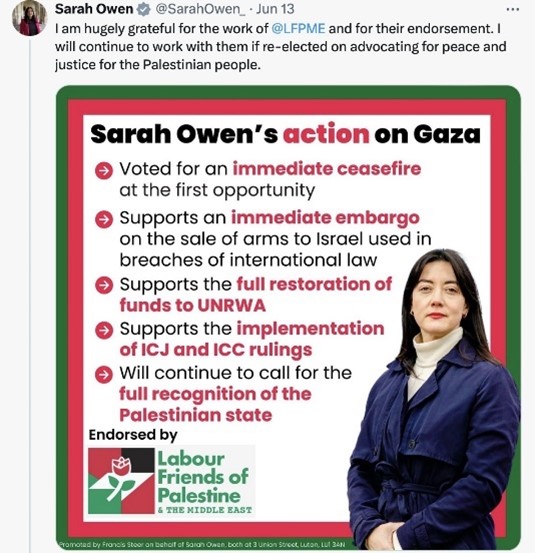Head of Public Policy Tim Dieppe comments on the growing influence that Islam is having on this nation, in the lead up to the general election
The 2024 general election is probably the first time that we have seen an Islamic agenda openly influencing an election in the UK.
This influence is seen clearly in the extent to which parties and candidates are keen to present themselves as supportive of Palestinians in the Gaza conflict. There is also a concerted campaign to get Muslims voting on Islamic issues.
Muslim votes may swing marginal constituencies
The Henry Jackson Society has released a report showing that Islam is the largest minority religion in 129 of the 220 most marginal seats in the general election. That’s 58.6% of the marginal seats. A marginal seat is one where the margin of victory is expected to be no more than 10% of the electorate. There are 220 marginal seats in this election which is just over a third (33.8%) of all available seats.
Islam is the largest religious minority in more than half of the marginal seats currently held by the Conservatives (98 out of 176, or 55.6%). Islam is also the largest minority religion in all the marginal seats currently held by Labour (3 out of 3, or 100%).
The Henry Jackson Society website, has a helpful table showing the Muslim population in each constituency.
In 2011, Muslims represented 10% or more of the population in 82 constituencies. Today, they represent 10% or more of the population in 120 constituencies.
In 2011, Muslims represented 25% or more of the population in 21 constituencies. Today it is 30 constituencies.
Muslims now represent 50% or more of the population in 4 constituencies.
Support for a state of Palestine
Polling carried out in April this year found that British Muslims are more likely to have a positive view of Hamas than a negative one. Only one in four British Muslims believe Hamas committed murder and rape in Israel on 7 October 2023. Almost half of British Muslims feel more sympathy with Hamas than with Israel.
One in four British Muslims name the Israel/Palestine conflict as their most important election issue, compared with just 3% of the public. In the Rochdale by-election in February, George Galloway overturned a Labour majority by running an explicitly pro-Palestine campaign. After winning, Galloway said in his victory speech: “Keir Starmer, this is for Gaza.” In the May local elections, pro-Palestine candidates were victorious in areas with high Muslim populations.
Mindful of all this, political parties and candidates have been keen do declare their support for the Palestinian cause.
The Labour Party manifesto states that it will call for an immediate ceasefire in Gaza and the release of all hostages. It says that: “We are committed to recognising a Palestinian state as a contribution to a renewed peace process which results in a two-state solution with a safe and secure Israel alongside a viable and sovereign Palestinian state.” These statements are clearly in the manifesto in order to attract the Muslim vote. Israel believes that recognising a Palestinian state would be rewarding terrorism and that the result would be a new terrorist state. Recognising a Palestinian state will not help to achieve peace in the region.
The Liberal Democrat manifesto also says that they will call for an immediate ceasefire, and: “provide the space to reach a two-state solution based on 1967 borders with security and dignity for Israelis and Palestinians.” 1967 borders means prior to the six-day war of 1967 when Israel managed to capture the strategically important Golan heights. Remembering that almost as soon as Israel withdrew from Gaza in 2005, missiles were being fired from Gaza into Israel. The situation would be even worse if Israel was to withdraw from the Golan heights. Palestinians would then be able to fire missiles into Jerusalem and Tel Aviv.
The Green Party also intends to recognise a Palestinian state, as does the SNP. Plaid Cymru goes further by also calling for Israeli government ministers to be held accountable for war crimes, including genocide, and calls on “the UK Government to expel the Israeli ambassador until such time as the Israeli Government ends it apartheid and illegal actions.” It also wants a ban on arms sales to the state of Israel.
In addition to the manifestos, we have seen individual candidates calling for recognition of a Palestinian state. Labour candidate Sarah Owen is one example, tweeting her support for the Palestinian cause in the colours of the Palestinian flag.

The Labour candidate Sarah Champion, who has been MP for Rotherham, has also tweeted her support for the Palestinians in a tweet with Palestinian colours.

This is quite a turnaround for Sarah Champion who resigned as Shadow Secretary of State for Women and Equalities in 2017 after writing that “Britain has a problem with British Pakistani men raping and exploiting white girls.” This is merely a statement of fact, and a fact that has particularly affected her constituency in Rotherham. Nevertheless, it is a politically incorrect fact for which she was forced to resign and apologise. She has gone from being a fearless campaigner for the victims of these grooming gangs, to promoting the Palestinian cause in order to attract Muslim voters.
Many other Labour candidates are endorsed by Labour Friends of Palestine and the Middle East which calls for “immediate recognition of the State of Palestine by the UK Government.” The website currently lists 70 former Labour MPs as amongst its supporters.
The Muslim Vote
Earlier this year, a new initiative in British politics appeared – The Muslim Vote. My colleague Carys Moseley did a detailed exposé of The Muslim Vote (TMV) last month.
TMV has tweeted 17 demands to Kier Starmer. These include: recognising a Palestinian state, ending military ties with Israel, allowing Muslims to pray at school, removing the new ‘extremism’ definition, adopting the APPG definition of Islamophobia, and ensuring sharia compliant pensions are available at every workplace. That’s quite a list and, as I have written before, adopting the APPG definition of Islamophobia would result in an Islamic blasphemy law.
The approach of TMV is sometimes quite threatening. In a now deleted tweet, TMV said: “Now @UKLabour the scary thing for you is we’re only going to get stronger from here. You may win the 2024 battle but we are here for the 25 year war. And it is not going to look pretty for Labour if it continues as it is today.”
TMV has recommended candidates for multiple constituencies in this election. Many of these are independent candidates. Some are standing for the Green Party, and some for the Workers Party of Britain – George Galloway’s party. A couple of endorsed candidates are Liberal Democrats.
TMV has introduced Islamic sectarian politics into the UK. Islam has not influenced UK politics before in any meaningful way. Now it has started to. This influence is only likely to increase from here.
Candidates exposed
A candidate endorsed by The Muslim Vote, Akhmed Yakoob, is standing as an independent candidate in Birmingham Ladywood which has 42% Muslim electorate. He has been forced to apologise after saying on a podcast earlier this year that “70% of hell is going to be women.” He also made inappropriate comments about domestic violence. His campaign is centred on support for Palestine, with posters calling on people to “lend Gaza your vote.”
A Plaid Cymru candidate was dropped after The Telegraph revealed that she had liked tweets from Nick Griffin, the former leader of the BNP, and had liked a social media post describing Hamas as “the resistance.”
More exposures will doubtless emerge over time.
Welcome to Islam influencing UK politics
Whatever happens in this election, which may turn out to be historic for other reasons, it may well go down in history as the first UK election in which Islam had a significant influence. The influence of Islam is only increasing over time as Islam grows faster than other religions. If this is the first election with Islamic factors playing a part, it certainly won’t be the last.

